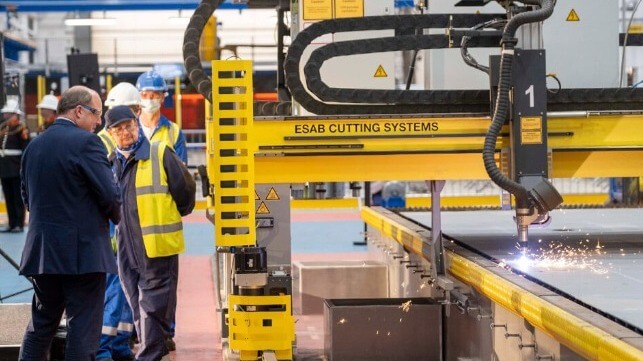UK's Shipyards Look for New Ways to Plug Workforce Gaps

The U.S. has a well-publicized challenge in finding and retaining enough qualified shipyard workers, but it isn't the only nation with a shortage of skilled labor. The UK's top defense shipbuilders are trying new ways to solve persistent gaps between the workforce they have and the workforce they need, like introducing top-notch automation and creating new entry-level opportunities.
At BAE Systems' yard on the Clyde, there are currently about 200 vacancies, and managers need to staff up to support a new eight-ship frigate contract for the Royal Navy. In years past, UK yards could raid the European labor market for qualified welders when needed, managing director Simon Lister told Glasgow Times - but that is no longer an option. BAE is investing in training instead, as well as a brand new highly-automated panel line.
“The availability of steelworkers has been a challenge for all shipbuilders in the UK," Lister said.
BAE has its own shipbuilding academy and a growing apprentice program, which will expand to about 1,000 personnel by next year. The yard and its competitors emphasize that they aren't just looking for welders, but also for people with all kinds of skills, like programming, finance and project management.
Babcock's Rosyth shipyard has found its own way to help resolve persistent manning shortages. It has a robust apprenticeship pipeline, but it has also realized that not every shipyard worker has to be a high-skill employee from the start. Many support tasks can be performed by personnel with a relatively basic skillset. Babcock has started hiring ordinary people who can pick up some of these less-skilled tasks and relieve pressure on the high-skill union workforce, the yard told Defence Connect. The new Production Support Operative (PSO) hiring pipeline selects for people with a good attitude, even if they do not have relevant qualifications, and provides them with enough training to support experienced workers. Down the road, they may have an opportunity to apply for an apprenticeship.
For its part, the UK government has completed a study on shipbuilding skills and is standing up a new working group to advocate for the industry's workforce needs. Public perception is one of the key challenges, the study found: in the UK, it is often viewed as an outdated industry in decline, and prospective employees may not know of recent investments and improvements.
